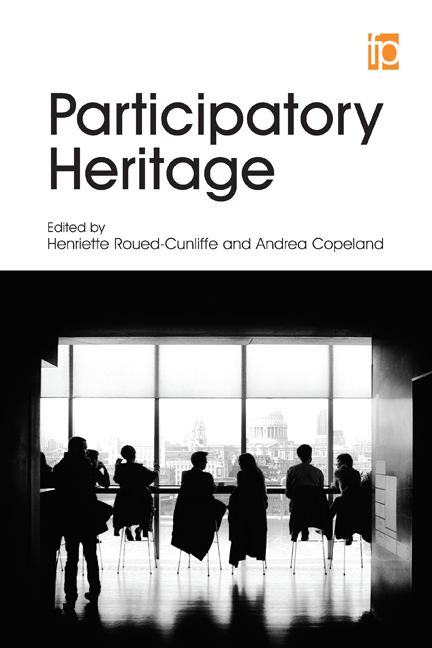Book contents
- Frontmatter
- Contents
- List of figures and tables
- Contributors
- Introduction: what is participatory heritage?
- Part 1 Participants
- Part 2 Challenges
- 8 Custodianship and online sharing in Australian community archives
- 9 Who is the expert in participatory culture?
- 10 Social inequalities in the shaping of cultural heritage infrastructure
- 11 No Gun Ri Digital Archive: challenges in archiving memory for a historically marginalized incident
- 12 Giving voice to the community: digitizing Jeffco oral histories
- 13 Issues with archiving community data
- Part 3 Solutions
- Further reading
- Index
9 - Who is the expert in participatory culture?
from Part 2 - Challenges
Published online by Cambridge University Press: 08 June 2018
- Frontmatter
- Contents
- List of figures and tables
- Contributors
- Introduction: what is participatory heritage?
- Part 1 Participants
- Part 2 Challenges
- 8 Custodianship and online sharing in Australian community archives
- 9 Who is the expert in participatory culture?
- 10 Social inequalities in the shaping of cultural heritage infrastructure
- 11 No Gun Ri Digital Archive: challenges in archiving memory for a historically marginalized incident
- 12 Giving voice to the community: digitizing Jeffco oral histories
- 13 Issues with archiving community data
- Part 3 Solutions
- Further reading
- Index
Summary
INFORMATION PROFESSIONALS SUCH as librarians and archivists are no longer the sole authorities in the distribution, presentation and retrieval of information. The internet is a game changer and the possibilities and challenges for cultural institutions are many, as this case study – an assessment of two small local history archives – demonstrates. In this chapter we discuss the pitfalls of the ‘cathedralized’ archive (see below), and point out the positive aspects of loosening control, hopefully showing how important participation is to everybody involved in the preservation of local heritage.
Less than 200 metres east of Copenhagen, Denmark, lies the small island of Amager, which for centuries was used as a dumping ground for waste from the Danish capital and was the unattractive new home of Flemish farmers migrating to Amager in the 16th century. ‘Trash Island’ is one of the less flattering monikers of Amager, home to almost 200,000 Amagerkanere, or Ama'ricans, as the local citizens, tongue in cheek, call themselves. Ama'ricans tend to be quite the patriots when it comes to their island, and thus it is no surprise that Amager has several local archives. One of these is SULFA, Sundby Lokalhistoriske Forening og Arkiv, a small, volunteer-run archive. SULFA has an extensive archive of photos, some of which are accessible once a week on the archive's one PC. Another archive is the privately owned, electronic-source-only Grandts.dk, a website created by Jørgen Grandt which features an extensive collection of photos, maps, posters and Amager-related history. Additionally, Jørgen Grandt moderates a public group on Facebook, Amagerhylden, which is open to everyone with an interest in local history.
The cathedral versus the bazaar
Although the two archives might at first glance seem similar, there are distinct differences in their approach to archiving, collecting and sharing and, not least, in their accessibility to the general public. Both SULFA and Grandts.dk have a leader – in the case of the former, the chairman of the board, and in the case of the latter, the website owner Jørgen Grandt – neither of whom is affiliated with or has an official connection with any of the museums in Copenhagen.
- Type
- Chapter
- Information
- Participatory Heritage , pp. 87 - 96Publisher: FacetPrint publication year: 2017
- 4
- Cited by



